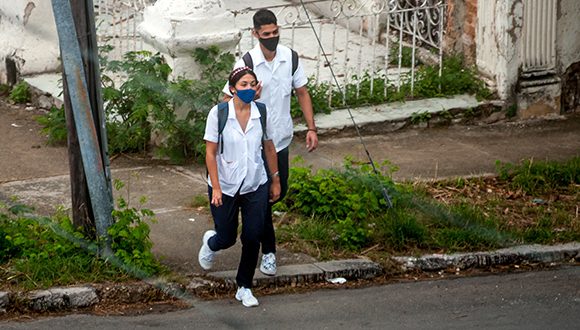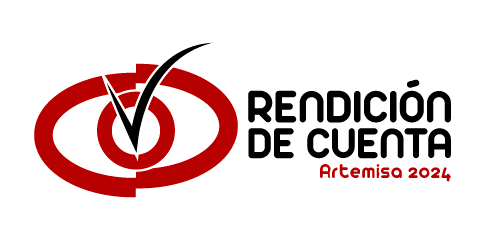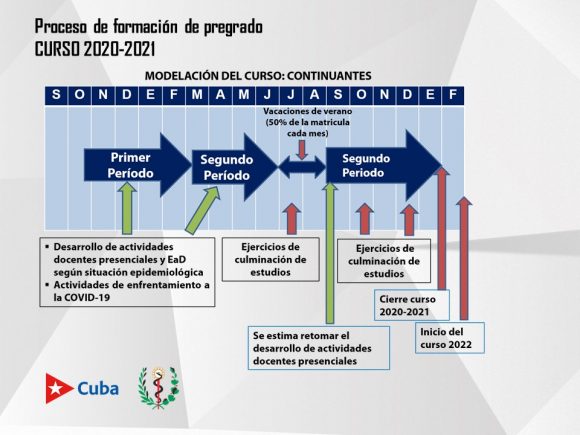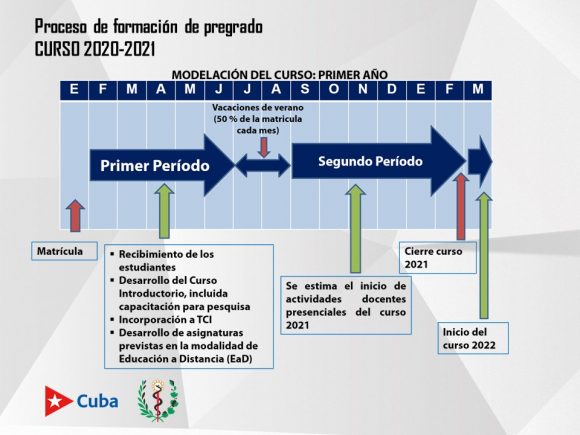
In higher education institutions attached to MINSAP, the undergraduate academic year began for continuing students on October 26, 2020, and on February 1, 2021 for the first year. All students remain in the activities to confront COVID-19, and at the same time develop teaching activities, adopting in each case the most appropriate modality according to their type of training and year of study, highly dependent on the epidemiological conditions existing in each territory, which has been variable over time. This is legally protected in Resolution 132/2020 of the Minister of Public Health and 03/2021 of the Minister of Higher Education, supplemented at all times with Indications and Methodological Orientations of the Ministry of Medical Teaching Directorate of MINSAP.
The course began in person in October 2020 in all the Universities, except in Pinar del Río, Sancti Spiritus and Ciego de Ávila, which had a complex epidemiological situation. In January of this year, due to the decline in the epidemiological situation in almost the entire national territory, new indications and methodological guidelines were developed to give continuity to the course. These were evaluated with all the Universities of Medical Sciences of the country, in them the indications of the ministries of Education and Higher Education were taken into account, and they were seen together with the student leaders in each institution, and later in the National Council of the FEU held last February, listening to all possible opinions and recommendations.
The important missions that students and professors of Medical Sciences have fulfilled in the course of this pandemic should be highlighted, as has the entire university community in our country, without abandoning individual study and the development of possible teaching tasks to be developed.
For the development of the school year, the following premises have been defined:
Prioritize activities to confront the epidemiological situation in the country, since our main task is to prevent transmission and its effects.
- Maintain quality and rigor in all teaching processes that are developed.
- Guarantee the acquisition of skills and overcome the objectives declared in the study plan, as a condition for promoting and / or graduating.
- Extend the 2020-2021 Course as long as necessary to achieve the training objectives.
- Maintain Comprehensive Community Work (TCI) and in parallel Distance Education (EaD), this for the subjects that were planned in this modality.
- Develop the subjects of the profession in person, when possible, to guarantee the development of practical skills.
- Promote the development of the Virtual University of Health.
As part of the activities to confront the epidemiological situation in the country, medical science students have actively participated in different activities related to confronting COVID-19, fundamentally the active investigation, but they have also followed up on admission to the home, follow-up of contacts of positives and suspects, work in isolation centers, management of the information generated by all these processes, support for international health control, development of clinical trials, studies and health intervention of vaccine candidates, preparation of hypochlorite solutions, support for molecular biology laboratories and taking samples for PCR, among other tasks, various tasks.
Parallel to this, the students have studied through the Distance Education (EaD) modality selected subjects, which due to their characteristics do not imply the development of skills, especially those of general training and their own and elective / elective courses. In no case have the subjects of the profession been included, those that require presence for the development of skills. Neither were subjects in the field of basic biomedical sciences included due to their complexity and importance for the rest of the training. It is planned that these subjects will be taught in person, once the epidemiological situation allows it..
However, in order to keep the student motivated and linked to the profile of their training, it has been organized that through the EaD this time can be used in the virtual classroom, and for this the theoretical contents of some of these subjects have been placed, to that the student becomes familiar with the subject, does not lose the study habit, and can individually build his knowledge, which surely allows him to approach the profession and also understand many of the things he does in the tasks of confrontation that he develops, since he has the advantage, unlike other university students in the country, that his task is always linked to his profession, in some of its edges.
In order to better explain the current assessments of the possible "modeling" or forecast of the development of the school year, this has been divided into two groups, those related to first-year students of all undergraduate training, and students from the rest of the the years, which have been called “continuous”. Like any prognosis, its development is subject to the variables that influence it, and therefore this must be taken into account in its interpretation, while each university, according to the different training it develops, will have to evaluate the necessary curricular adjustments that you will have to develop to approach this modeling.
It is impossible in a general explanation to be able to explain the particularities of each one of the territories, and much less of each one of the formations (careers, higher technician and middle technician), and even everything related to the qualification of the skilled workers that The universities of medical sciences develop, so in all cases it will be necessary to clarify some issues specific to each territory with the university authorities of each place, which can offer details and greater precision of the expected reality to their students.
The governing body, the Ministry of Higher Education, in Resolution 03/2021 of its Minister, dated January 22, 2021, established as a policy that all measures to be applied should be in accordance with the territorial conditions, the guidelines issued by the provincial defense councils, and others decided by the universities, taking as a reference everything that has been regulated, indicated and oriented at all times, taking into account the important role of youth and student organizations, that is why there will always be take into account what the FEEM, FEU and UJC say, as part of the mission to protect our people, but also our students, teachers and workers of higher education institutions.
Modeling of the course for the first year in Medical Sciences:
Enrollment took place in January, the students were received at the polyclinics on February 1 and from there the introductory course was given, which included training on COVID-19, especially the measures of biosafety to ensure the protection of the student, as well as the techniques for their participation in the active investigation. The students immediately joined this activity and began studying the subjects selected for distance education (EaD) in parallel.
In the case of Medical Sciences, the base nucleus of these students is the polyclinic and the Family Doctor's Office to which they are linked, respecting territoriality, that is, always linked to the place where the student resides, it does not matter to the faculty or affiliate of which it is registered in your university. This is better understood when taking into account that there are specific training faculties, such as stomatology, nursing and technology, whose enrollment is dispersed throughout the province, so the organization was made according to each polyclinic, and not by origin faculties..
It has been a principle, which we repeat insistently, that the subjects of the profession will be carried out in person, to which we have added, as we mentioned before, those related to the basic biomedical sciences, since these provide the cognitive bases for a better understanding of the rest of the subjects related to the exit profile of the profession. The development of such subjects in the midst of the existing limited autochthonous transmission has not been indicated, but they have to be developed at times when a face-to-face activity is possible. Notwithstanding the foregoing, as the situation in each territory has been variable, in some cases some face-to-face activities may have been developed at a certain time, and in others it has not been possible to begin these subjects so far.
Taking into account the possible estimates that the epidemiological situation could have, together with the population vaccination process, as well as other measures that have been taken, it could be thought that by the month of September 2021 there could already be a change in the behavior of the epidemic in our country, which could allow us to develop face-to-face educational teaching activities in most provinces.
Based on this, this "modeling" proposes the beginning of face-to-face academic activities in the month of September 2021, which could allow us to close the current school year for the first year in February 2022. The course would last for about 6 months, with intense face-to-face activity, favored by having already developed subjects in EaD that leave that space for those that have not been able to be developed. For this, curricular adjustments will be made to achieve the objectives, with rigor and quality, which include readjustments in the contents, changes in evaluation systems, transfer of topics to other years if necessary, among others. (See figure 1)
Modeling of the course for students of the continuing years
In general, the course began on October 26, 2020 in person at almost all universities, except in Pinar del Río, Sancti Spiritus and Ciego de Ávila due to their complex epidemiological situation. It was possible to expire almost the first semester and even to conclude it in some territories, although some universities were behind.
In January 2021, as the epidemiological situation receded in an almost general way, the work of the students in the tasks of confronting the COVID-19 intensified, so that almost all those who had been able to maintain the face-to-face activity had to suspend it. Under these conditions, it was indicated to move to the distance education modality (EaD) in the subjects that were selected for each training. This sought to keep students in some type of educational teaching process, but at the same time it allowed to gain time funds for the moment in which they could return to face-to-face activity, and then have a higher weekly frequency for those subjects that require the development of skills and direct work in the Services in person. It was taken into account that this would also facilitate the study and have less evaluative pressure on the students, at least the subjects in development at the same time.
Based on the existing modeling, which we know may undergo modifications according to epidemiological behavior, the start of face-to-face activities is estimated for the month of September 2021, and based on that, the current school year may conclude at the end of January 2022.
In the particular case of the terminal year, as happened last year, an attempt has been made to maintain face-to-face activity in almost all territories, for all undergraduate courses. However, due to the high number of COVID-19 cases that have occurred in the last two months in many territories, together with the development of clinical trials and the study and health intervention of vaccine candidates, a greater number has been needed of students for these tasks, so there has been a need to interrupt the teaching program in development in many places, since it is indicated that the priority is to develop all the activities that the territory needs in function of the confrontation with COVID-19.
As it is indicated that no student can graduate if they have not acquired all the skills and met the objectives stated in the study plan, it is estimated that a significant number of students may not be in a position to take the State exam in the month of July. of 2021, as was initially planned, especially those of the regular course. In this case, depending on the province, the training, if it is a regular or meeting course, and the rotations or stays that each student is responsible for developing, it is very possible that they have pending rotations that they have not been able to carry out and that prevent their graduation on the planned date, which will have to reorganize each institution of higher education based on its specific situation.
Three moments are then proposed for the first call for the State exam, in addition to the month of July, adding another two options in October and December 2021. It is reiterated that it must be guaranteed that each student who takes an exam has acquired all the skills and after the objectives, which is of greater importance for the State. (See fig. 2).
Taking into account the need for summer vacations for all students and teachers, but that according to existing estimates the epidemiological situation could still be complicated in the months of July and August, it will be arranged that half of them plan their vacations for the the month of July and the other half in the month of August, so that there are always students and teachers linked to all the tasks to confront COVID-19, and to all the impact tasks that are being developed at that time in each territory , which must be planned and organized in good time by each higher education institution.
In the case of postgraduate studies, the same premises and general indications mentioned above are taken into account, the priority being to put all the forces in order to contain the existing epidemiological situation. The foregoing does not contradict the parallel development, whenever possible, of the educational teaching process, since in some cases, such as the specialties of MGI, Intensive and Emergency Medicine, Epidemiology, among others, they have maintained, or even intensified its care work, making all this activity for educational purposes recognizable.
In summary:
- The continuity of the 2020-2021 course in the Higher Education Institutions (HEIs) attached to the MINSAP is based on the principle that the most important thing is to contain the transmission, and that all its forces and enrollment are linked to that task, without abandoning other prioritized (PAMI and Cancer, among others).
- That the educational teaching process that is maintained must be with QUALITY and this must comply with what is established in the training programs.
- The 2020-2021 Course will be extended until it is necessary to achieve the training objectives.
- A modeling of what is estimated to happen in relation to the school calendar is established, which is subject to all the variables that derive from the real behavior of the epidemiological situation in each territory.
- It is oriented to give a differentiated treatment to foreign students, according to the policy indicated for each case.
CUBADEBATE







Read more...